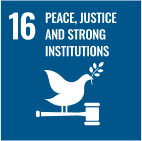sdg:
sdg:
-
16
Commitments and Management Practices
In light of the complexity of our business, the size of our operations and aimed at translating our organizational culture and established commitments, we maintain a series of policies that lay down guidelines on different topics, contributing to our continuous alignment with the best market practices and our ESG commitments. To ensure the evolution of our governance, in 2023, we reviewed the Human Resources, Construction Works, Hiring of Audit and Extra- Audit Services, Securities Trading policies as well as the Company’s Code of Conduct.
We align our commitments, decisions and processes considering institutionalized policies, and the Executive Board is responsible for overseeing and implementing them. These policies are presented to new employees during onboarding, and reinforced in training sessions throughout the year.
Our policies
We align our commitments, decisions and processes with institutionalized policies based on internationally recognized intergovernmental instruments, such as the UN Global Compact, IFC’s Ethical Principles in Health Care (EPiHC), the International Labour Organization (ILO) and the Universal Declaration of Human Rights, among others. These policies are presented to new employees during onboarding and reinforced in training sessions throughout the year.
- Policy for Hiring Audit and Extra Audit Services
- Code of Conduct
- Report on the Brazilian Code of Corporate Governance
- Securities Trading Policy
- Related-Party Transaction Policy
- Health Safety and Environment Policy
- Material Fact Disclosure Policy
- Stakeholder Engagement Policy
- Internal Audit Policy
- Climate Change Policy
- Sustainability Policy
- Human Rights Policy
- Social Responsibility Policy
- Risk Management Policy
- Compensation Policy
- Nomination Policy
All ESG policies and voluntary sustainability commitments have been approved by the Board of Directors and are available on Rede D’Or’s Investor Relations website, for consultation by all stakeholders, including business partners and other relevant parties [GRI 2-21, 2-23].
Nomination and selection for the highest governance body
GRI 2-10
The nomination of members to the Board of Directors, committees and executive board is governed by the Nomination Policy, which establishes the criteria to be followed for appointments, according to each position. Existing prerequisites must be proven through documents, and nominees cannot incur any of the possibilities of barring access to the position. In order to reap the benefits of diverse arguments and a better and safer decision-making process, the policy also establishes the criteria for the composition of governance bodies, which include diversity of knowledge, backgrounds, behaviors, cultural aspects, age group and gender.
Responsibility analysis and delegation
GRI 2-12, 2-13
The Board of Directors sets out all guidelines, which are developed by the Executive Board, in accordance with article 22 of the Bylaws.
The Chief Executive Officer is responsible for the Company’s management and administration; developing activities and projects related to business goals; performing the corporate duties assigned to him; complying with the provisions of the Bylaws and any shareholder agreements, preserving good relationships with customers and suppliers; as well as maintaining the ethical, upright and professional conduct inherent to the position.
The impact management process is monitored through monthly meetings of the Audit Committee, which reports the results to the Board of Directors on a quarterly basis and prepares a consolidated Annual Report once a year.
He is also responsible for leading the development of the Group’s ESG strategy, seeking cooperation between different departments, and ensuring that the concept is embodied in the organizational culture, transforming it into a relevant corporate value for defining the Company’s identity. Therefore, the CEO relies on the support of the vice presidents to ensure that their departments are aligned with the ESG Strategic Plan.
Senior Management also has the support of the Sustainability Committee (read more in Governance Structure), whose chairman is responsible for forwarding discussions on sustainability to the Board of Directors and the Chief Executive Officer.
We have an internal standard that defines roles and responsibilities for ESG Management, in order to ensure that the activities inherent to the topic are properly evaluated, processed, monitored and communicated in an effective and efficient way, both at the strategic and operational levels.
All ESG strategies, goals and policies are approved by the Board of Directors, which periodically evaluates the effectiveness of the processes, through reports from the Sustainability Committee.
Senior Management performance assessment
GRI 2-18
The Chairman of the Board of Directors conducts a formal and structured performance assessment of Senior Management at least once each tenure, aimed at systematically improving the body’s efficiency. If necessary, a specialized external consultancy is hired to support the process. Any member of the Board of Directors and Executive Board who has been in office for at least four ordinary meetings since the last assessment will be eligible to participate in the process, as an assessor or assessee. Assessees must answer specific questions and make their assessment of the five fundamental dimensions for the effectiveness of the body under evaluation: strategic focus, knowledge and information about the Company’s business and operations, body’s independence and work process, how the body and meetings operate, motivation and alignment of interests.
Details in the 2023 Reference Form.
The way in which the consolidated results of the assessments of the Board of Directors, its members, the Company’s officers and the members of the Audit Committee are disclosed, including feedback, is described in item 7.1b of the Reference Form.

Compensation
GRI 2-19, 2-20, 2-21
We have a Compensation Policy that lays down the criteria and procedures for defining the compensation of key personnel (members of the Board of Directors, the Executive Board, and to the extent applicable or convenient, case by case, members of the Audit Committee and other Company committees and strategic positions held by people with authority and responsibility for planning, directing and controlling Rede D’Or’s activities, whether directly or indirectly).
See details in the Reference Form 2023. Item 10.3 (d) containsinformation on the proportion between the highestindividual remuneration and the medianindividual remuneration of employees.
Compensation Policy
We follow the criteria below to define our executives’ compensation:
- Alignment of the interests of key personnel with the Company’s goals;
- Attracting, rewarding, retaining and encouraging key personnel to conduct their business in a sustainable manner, abiding by appropriate risk limits;
- Offering compensation based on criteria that differentiate performance while also allowing for the recognition and appreciation of individual performance;
- Keeping standards compatible with the responsibilities of each position and competitive with the reference job market, establishing guidelines for determining any compensation and benefits granted.
The overall compensation of key personnel may consist of:
• Fixed Compensation: established based on the level of responsibility of each position or role; on the individual expertise and qualifications required; and on other factors that the Board of Directors deems relevant or appropriate, on a case-by-case basis. It is divided into monthly salary and benefits;
• Variable Compensation: consists of one or more profit-sharing plans or programs to reward the Company’s achievement and surpassing of goals, aligned with the performance, sustainability and growth strategy of the Company’s business in each fiscal year;
• Share-based Compensation: additionally, key personnel will be entitled to long-term share-based incentives, aimed at generating incentives, as well as aligning their interests with those of the Company to maximize the creation of value for the business, through consistent and sustainable results, both in the medium and long term;
• Other components eventually resolved by the Board of Directors within the limits imposed by Rede D’Or’s Shareholders’ Meeting.
Compensation amounts are periodically compared through external surveys to evaluate adjustments to compensation components.
The overall compensation of the members of the Board of Directors and the statutory Executive Board is set by the Company’s Annual Shareholders’ Meeting, and the Board of Directors must set the monthly compensation of its respective members and the statutory Executive Board. Read more about the compensation of Rede D’Or’s key personnel in our Reference Form (items 8.1 to 8.19, pages 414 a 460), on the Company’s website.
Communication of critical concerns
GRI 2-16, 3-3
ESG topics and practices are consolidated and reported quarterly to the Sustainability Committee, covering sustainability/ESG processes, strategy and management. As a result of these discussion forums in the Sustainability Committee — which includes the executive vice president, officers, managers, as well as experts from various areas —, critical concerns linked to the ESG agenda are communicated to the highest governance body in ordinary and/or extraordinary meetings and recorded in minutes.
In 2023, the following topics in the social and governance pillar were submitted to the Board of Directors: the status and progress of cybersecurity initiatives at Rede D’Or, approval of the Policy for Hiring Audit and Extra Audit Services, approval of the update of the Company’s Securities Trading Policy, approval of the update of the Code of Conduct, analysis of the proposal for management compensation, human resources dynamics, overall annual management compensation for fiscal year 2023, installation of the Fiscal Council and election of its members, and amendment to the Company’s Bylaws.
In the environmental pillar, the main critical concerns referred to Climate Change and were addressed by the Sustainability Committee and communicated to senior management through the publication of TCFD reports, available on Rede D’Or’s website.
When it comes to critical concerns related to socio-environmental issues, we rely on the support of various advisory bodies, such as those mentioned throughout this chapter. However, we would like to highlight the importance of the Sustainability Committee, which brings together the executive vice-president, directors, managers, as well as specialists from a wide range of areas, with the aim of debating technical issues specific to ESG aspects. Meetings are held quarterly or on demand, according to the need to achieve the proposed objectives.
The Sustainability Committee plans to meet at least three times a year to discuss sustainability and climate change issues. However, due to a change in the executive vice-president in the second half of the year, who was also chair of the Committee, it was only possible to hold one meeting in 2023, which dealt with progress on ESG targets and climate change.
The minutes of all meetings can be accessed here.
Total number and nature of concerns on the ESG agenda
| Dimension | Nature | Number | Registro |
|---|---|---|---|
| Governance | Cyber security | 1 | Public minutes |
| Approval of the Policy for Hiring Audit and Extra Audit Services | 1 | Public minutes | |
| Approval of the reelection of the Company’s Executive Officers | 1 | Public minutes | |
| Approval of the Company’s Securities Trading Policy | 1 | Public minutes | |
| Approval of the update of the Code of Conduct | 1 | Public minutes | |
| Installment of the Fiscal Council and election of members | 1 | Public minutes | |
| Amendment to the Company’s Bylaws. | 1 | Public minutes | |
| Status of ESG targets | 1 | Minutes for internal use | |
| Social | Dynamics of the human resources department | 1 | Public minutes |
| Overall annual management compensation | 1 | Public minutes | |
| Environmental | Climate Change (CDP| TCFD) | 1 | Public document (CDP | TCFD ) |
| Energy Efficiency | 1 | Minutes for internal use | |
| Total | 12 |

